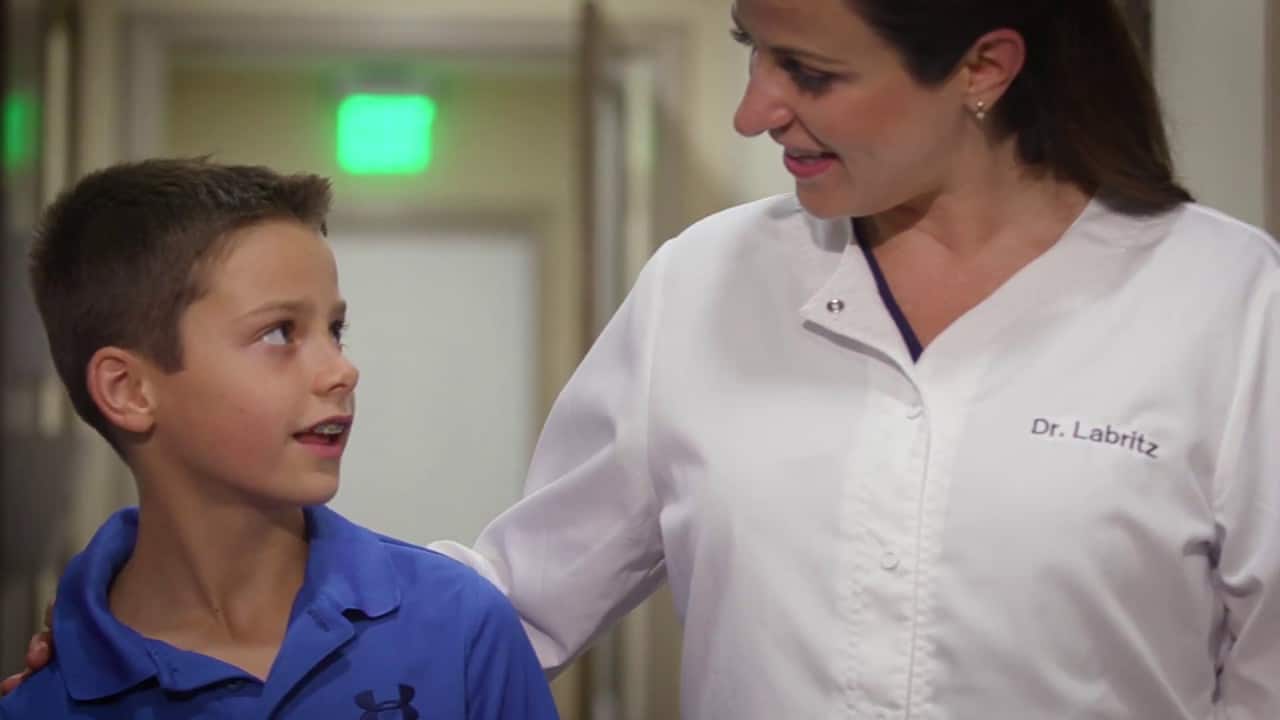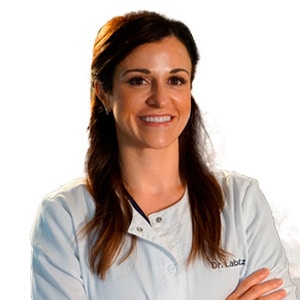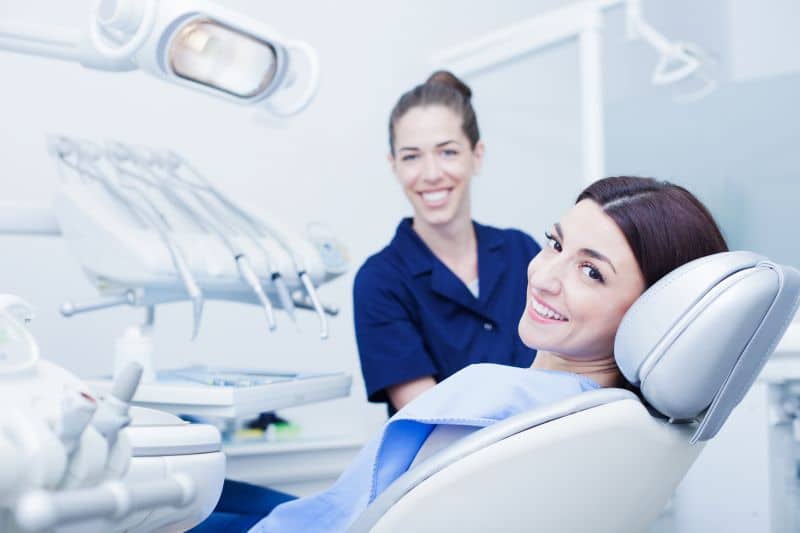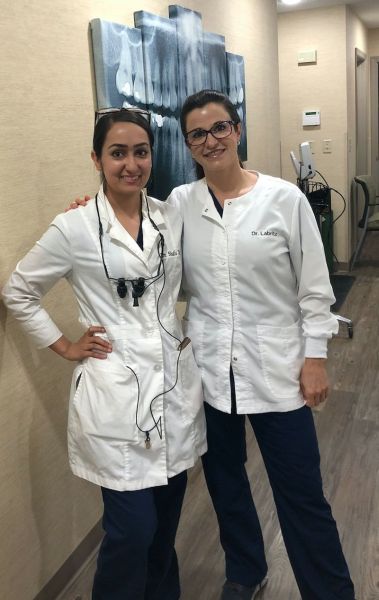Dr. Caroline Labritz grew up in dentistry with her father, Dr. P. Ronald Graziani, who maintained a successful practice in Fairmont since 1976. Dr. Labritz spent many summers and holiday breaks helping in the office which sparked her interest in following in her father’s footsteps.
Dr. Labritz graduated from the West Virginia University School of Dentistry in 2004 with a Doctorate of Dental Surgery Degree. She spent her first six years practicing in Morgantown until coming back to Fairmont in 2010 to practice with her father in the Graziani Labritz Dentistry practice.
As the years went on, Dr. Labritz felt a desire to return to Morgantown to once again provide services to patients in the area. Her passion and an opportunity came together, and in 2016, she joined forces with Dr. Diana Frum to form Dental Arts. After much thought, Dr. Labritz renamed Dental Arts to Sorriso Dental, a name that represents the practice for not only where it is going, but from where it came from. To pay respect to its previous dentists, Dr. P. Ronald Graziani and Dr. Diana Frum, both of whom have significant Italian heritage, the name Sorriso Dental was chosen. Sorriso means “Smile” in Italian.
Dr. Labritz is an avid learner and researcher of all things dental. With a passion for the profession, she invests a great deal of time on Continuing Education hours in order to provide the highest quality treatments for her patients. Dr. Labritz is a Fellow of the International Dental Implant Association, member of the American Association of Implant Dentistry, member of the Academy of General Dentistry, Monongalia Dental Association, West Virginia Dental Association, and American Dental Association. With additional training in dental implants, modern Root Canal Therapy, Invisalign, Cosmetic Makeovers, you will find her very knowledgeable in all aspects of dentistry. Patients quickly see her gentle manner and special interest in children. Dr. Labritz has a special place for children and prides herself on calming the fears often associated with dental treatment.
In her personal life, Dr. Labritz is married with two active boys. She enjoys baking and cooking in her free time. She also likes to read a good book or two. She is very active in fitness and nutrition as well.
Why is visiting the dentist so important?
Visiting the dentist regularly will not only help keep your beautiful smile of teeth healthy, but will also help keep the rest of your body healthy. Dental care is important because it:
Helps prevent tooth decay
Protects against periodontal (gum) disease, which can lead to tooth and bone loss
Prevents bad breath – brushing, flossing, and seeing the dentist regularly will help reduce the amount of bacteria in your mouth that causes bad breath
Gives you a more attractive smile and increases your self-confidence
Helps keep teeth looking bright by preventing them from becoming stained by food, drinks, and tobacco
Strengthens your teeth so that you can enjoy healthy, beautiful smiles for the rest of your life!
How can I take care of my teeth between dental checkups?
ALWAYS remember to brush your teeth at least two times a day, and floss at least once!
Make sure to use toothpaste that contains fluoride, and ask your dentist if you need a fluoride rinse. This will help prevent cavities.
Avoid foods with a lot of sugar (sugar increases the amount of bacteria that grows in your mouth causing more plaque and possibly cavities) and avoid tobacco (this can stain your teeth, cause gum disease, and eventually lead to oral cancer).
Don't be afraid to brush your tongue! By brushing your tongue, you will remove food particles and reduce the amount of plaque-causing bacteria. Tongue brushing also helps keep your breath fresh.
Be sure to schedule your routine checkup. It is recommended that you visit the dentist every six months.
How often should I brush my teeth?
According to your dentist and the American Dental Association, you should brush your teeth at least two times a day. Brushing keeps your teeth, gums, and mouth clean and healthy by removing bacteria-causing plaque. It is also recommended that you use a soft-bristled toothbrush and toothpaste that contains fluoride when you brush your teeth. You should spend at least a minute on the top teeth and a minute on the bottom teeth, and remember to brush your tongue; it will help keep your breath smelling fresh!
Why is flossing important?
Flossing is perhaps even more important than brushing because it removes bacteria that are the precursors of plaque, which if left to fester will turn into tartar that cannot be removed by regular brushing or flossing. Tartar is what eventually causes the damage that leads to decay and tooth loss.
What can I do about sensitive teeth?
Sensitive teeth can be a result of a number of dental issues including periodontal (gum) disease, tooth decay/exposure of tooth roots at gumline, aggressive tooth brushing, wearing away of enamel on teeth.
Here are some natural ways to combat sensitive teeth:
Swap your toothbrush for a soft-bristle toothbrush and brush your teeth more gently
Avoid acidic foods like carbonated drinks, coffee, citrus fruits, and even yogurt. Also, don't brush your teeth after eating or drinking acidic foods. Have a glass of milk to neutralize the acid.
If you grind your teeth at night, wear a mouth guard
At what age should I start taking my child to the dentist?
The American Academy of Pediatric Dentistry (AAPD) recommends that children first see a dentist as early as six months of age and no later than one year of age.
During this time, your child's baby teeth will be coming in and your dentist can examine the health of your child's first few teeth. After the first visit, be sure to schedule regular checkups every six months.
How often should I see the dentist?
Children, teens, and adults should all see the dentist for a regular checkup at least once every six months. Patients who are at a greater risk for oral cancer or gum disease may be required to see the dentist more than just twice a year. Your doctor will help determine how often you should visit the dentist for regular checkups.
What is a cavity?
A cavity is the space inside a tooth that remains once tooth decay is removed. Plaque is one of the main causes of tooth decay. There are three places in the mouth where you can experience decay or cavities:
On the biting surfaces of the teeth - plaque becomes trapped in the grooves of the teeth, which is most common in children
Between teeth - this is a hard to reach spot that can be addressed by flossing
On the root surfaces of teeth - this is common if you have suffered gum recession or bone loss associated with gum disease
What is a filling?
A filling is a synthetic material that your dentist uses to fill a cavity after all of the tooth decay has been removed. Fillings do not generally hurt because your dentist will numb your mouth with an anesthetic. Fillings are made from a variety of different materials, including composites, gold, or ceramic. If you need a filling, be sure to talk to your doctor about what type is best for you and your teeth.
When should I change my toothbrush?
Your toothbrush will eventually wear out, especially if you are brushing your teeth twice a day for two to three minutes each time. Your dentist recommends that adults and children change their toothbrush every three months.
If you are using an electric toothbrush, be sure to read the directions because you may not need to change toothbrush heads as frequently. Patients with gum disease are encouraged to change their toothbrush every four to six weeks to keep any bacteria from spreading. After brushing, rinse your toothbrush with hot water to kill germs and keep the bristles clean. If you've been sick, be sure to change your toothbrush as soon as possible.
What is gum disease?
Also known as periodontal disease, gum disease is mostly caused by plaque and bacteria buildup that is not treated in its early stage. Other causes of periodontal disease include tobacco use, teeth grinding, some medications, and genetics. Gingivitis is the beginning stage of gum disease, and, if detected, is treatable. Gingivitis left untreated may turn into gum disease. Advanced gum disease will lead to tooth and bone loss, and is a permanent condition. Brushing your teeth regularly and visiting the dentist every six months will help prevent gingivitis and more severe cases of periodontal disease.
Common signs of gum disease:
Red, irritated, bleeding, or swollen gums
Chronic bad breath
Loose teeth, or loss of teeth
Extreme tooth sensitivity
Receding gum line
Abscessed teeth
How do I schedule a checkup?
Visit our Appointment Request page and fill out the Request an Appointment form, or you can call either office at any time.







